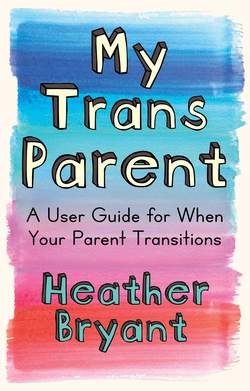Читать книгу My Trans Parent - Heather Bryant - Страница 43
На сайте Литреса книга снята с продажи.
WHAT IF YOUR PARENT ISN’T OUT?
ОглавлениеDana is still not out in her community. Years of rejection and meanness keep her very guarded about what she shares. After I left college, she wanted to be known as my parent, not my aunt, but she also didn’t want to be outed in the community. This left me and my sister in a difficult position. On the one hand, we didn’t want to out her to strangers. On the other hand, when Dana introduced us as her daughters, people automatically assumed she was our mom. It felt like we were lying to people all the time.
Dana went by the Mary Poppins principle: “First of all, I never explain anything.” This was nice in theory but didn’t always work in real-life situations. Sometimes it left questions hanging in the air unanswered.
I can be open, but when my parent’s more protective of who knows, it makes things complicated. Sometimes the excitement I have from the freedom I found through telling makes me want to drag her along with me. I want her to feel the same freedom. But I haven’t walked through the years of prejudice and assumptions. I haven’t experienced the rejection and fear she found when people learned her whole story. I choose to share my family story with friends, but she doesn’t share with everyone. Both of us have a right to our choices.
Each of us has our own separate way to navigate coming out or letting people in. What’s important is getting to know when or how you feel comfortable sharing your own story. Start there. Your family might influence some of that, but at some point you can make it your own. If your parent decides not to tell, you can still share it with close, trusted friends. Maybe you won’t rent a billboard with your story, but try to share it when you can. This is your story, too.
Danielle C. described how her family navigated this. “She very slowly told people and I let her take the lead on that. She told a couple sets of friends she knew her whole life, and my mom and her therapist and me. And that was it.” Over time, her parent came out to more people, and Danielle started to tell more people, too. First, she told her supervisor at work. “I cried in her office a little bit, because I just didn’t know how to handle it!” She was dating the man who became her husband at the time. It took her a month and a half to tell him. She told him on a car ride. At first he didn’t believe her. Turns out, she picked April 1, April Fool’s Day, to tell him. It took her a little while to convince him that she was serious. As she told more people, her own community network grew.
Before going to parties, Dana and I usually have a conversation to agree upon the story for the night. We match our stories up and go out into the world.
At a Christmas party with Dana’s friends, someone I’d just met said, “I like your mom—she’s got spunk,” and I wondered briefly how he knew my mom. Then I realized he was talking about Dana. I smiled and nodded.
This is something we’re still navigating. For now, I respect wherever she’s at and let those overlapping communities be hers to shape. I have plenty of people I can share the whole story with. I don’t need to tell everyone all at once.
Sometimes keeping secrets for so long can make us want to share more of our stories. Noelle said that after keeping a secret for a long time, she became eager to share as much as possible. She became resistant to the act of keeping secrets. “I am almost congenitally incapable of doing it or going along with it, even in other areas of my life.” After keeping this inside, we might want to shout it from the rooftops, but we can first check to see who might be coming along for the ride.
